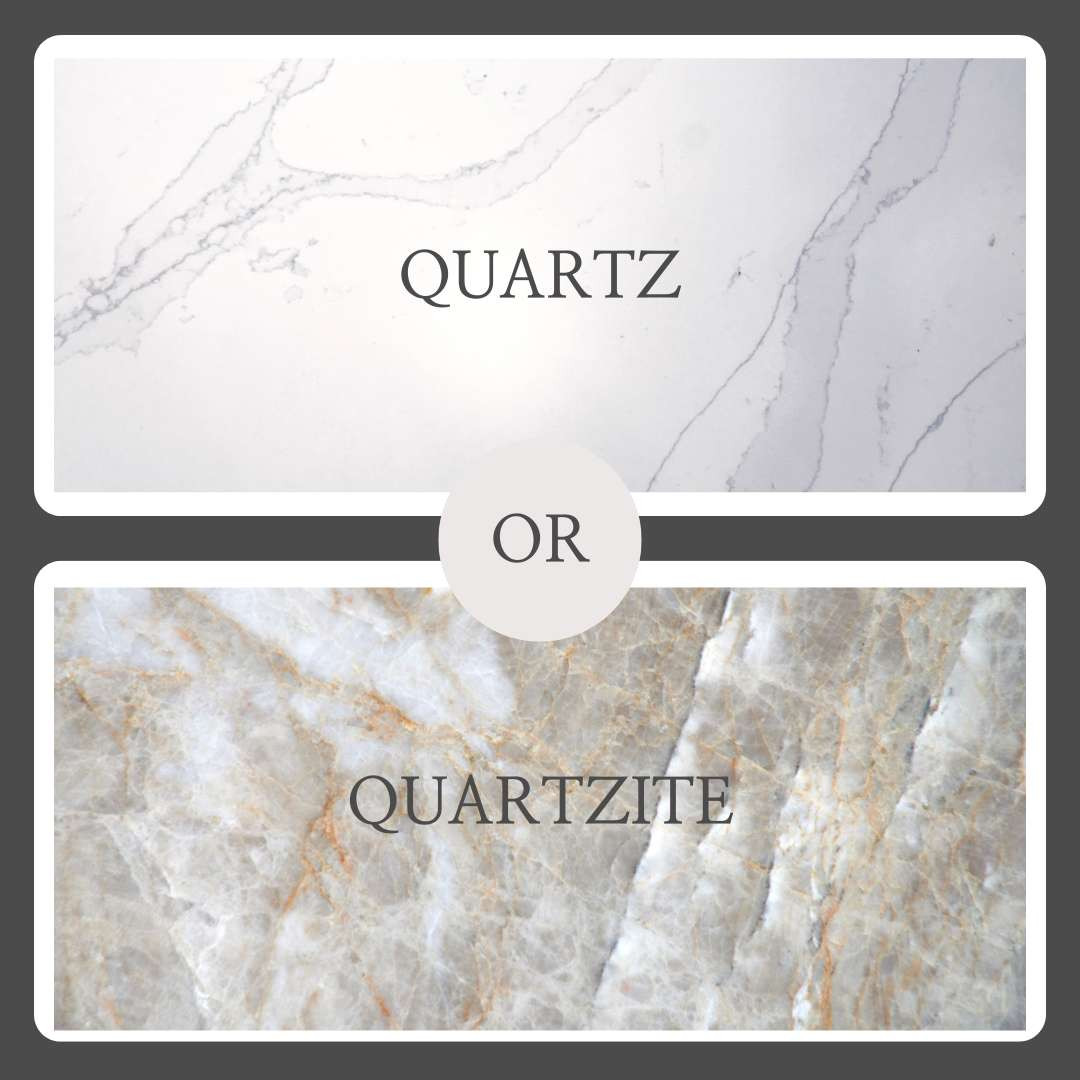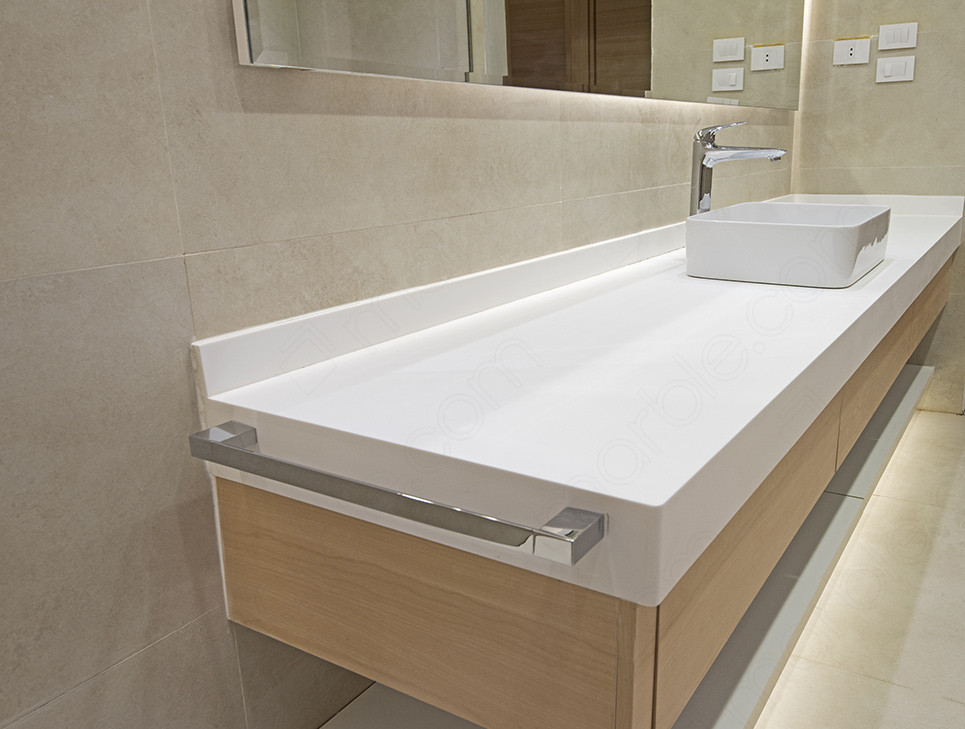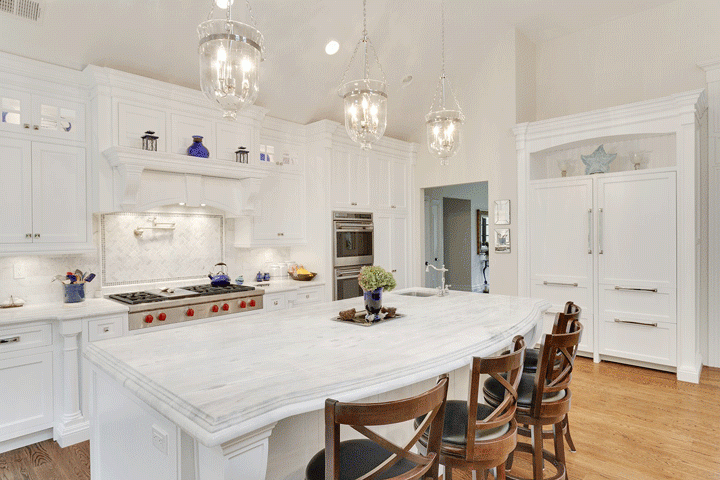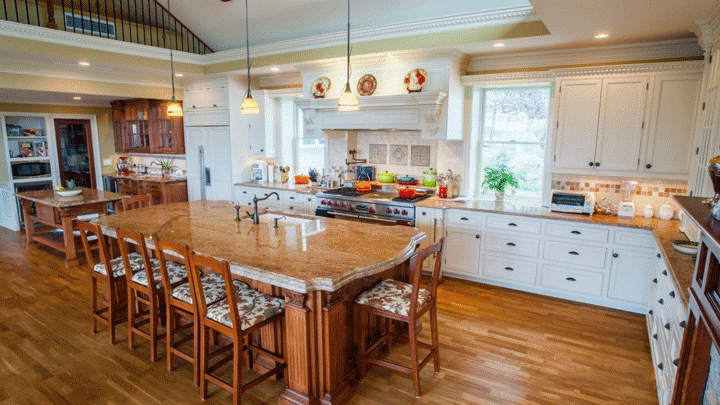Table of Contents

Quartz and Quartzite are two very hardy stones used for interior design and construction, which are often believed to be the same thing. Despite their names sounding remarkably similar, they have their own unique advantages and disadvantages.
When choosing countertop material for your kitchen and bathroom, understanding the differences between them will provide you with a clear answer on which you would prefer to install. Follow our comparison guide to see if quartz or quartzite is better for your kitchen countertop and bathroom vanity.
Defining Quartz and Quartzite
Before we start getting into the specifics of each stone, we need to define the difference between quartz and quartzite.
Quartz is an abundant crystalline mineral composed of silicone dioxide (silica) and found in the Earth’s crust. Quartz is one of the most common minerals on Earth, making it easily available in quarries. Quartz countertops are artificial stone slabs where the quartz mineral is quarried, fabricated into a slab with an adhesive resin, and dyed to create a variety of patterns and designs.
Quartzite is a naturally occurring, metamorphic rock formed from quartz sandstone. When quartz sandstone is superheated by magma and compressed under high pressures from tectonic shifting, the minerals fuse together into quartzite. Quartzite slabs are quarried from mines with an abundant amount of quartzite and compressed into a slab for interior design.
[get_quote]
Quartz vs. Quartzite: Stone Stats
Just because quartzite is made from quartz, does not mean they are the same thing. Due to how they were formed and are fabricated, they each possess their own unique pros and cons.
Hardness
Hardness refers to how hard or durable a mineral is. This hardness is checked by the Mohs Hardness Scale, which rates all stones on how hard they are. For reference, diamonds have a Mohs Hardness rating of 10 / 10, making it one of the hardest natural minerals on the planet.
Quartz and Quartzite both have a hardness of 7 / 10, making them extremely durable and resistant to damage.
Scratch Resistance
Stones installed as kitchen countertop material should have a high resistance for scratching and cutting as it will be utilized in a location with sharp objects like forks and knives.
Quartz has a high scratch resistance of 9 / 10.
Quartzite has a moderate scratch resistance of 7 / 10.
A general rule of countertop care is that homeowners should not directly cut foods or objects directly on the countertop surface. Stones may have a high scratch resistance, but they can still be scratched when worn down. Always use cutting boards and trivets when chopping food.
Stain Resistance
Whether it is in the kitchen or bathroom, stains can happen at any time. Rust stains form from wet metal objects being left on the countertop surface. Hard water stains form when water evaporates, and the tiny calcium deposits attach to the vanity countertop. Paint or hair dye can fall on the countertop and become absorbed into the stone’s pores. A stone with good stain resistance is great for long term care.
Quartz has a perfect stain resistance score of 10 / 10, making stains exceptionally easy to remove.
Quartzite has a moderate stain resistance score of 7 / 10, making it effective at cleaning and removing stains.
A general rule of countertop care is that homeowners should clean up stains and spills as quickly as possible. The longer a spill remains on a stone surface, the more likely it will be to stain. Quartz has an excellent stain resistance score, but it can still be stained if a spill is left on the surface.
Chip Resistance
A stone’s ability to resist chipping means it is strong enough to not crack or break. Having a good countertop surface that can withstand heavy objects and some damage is preferable to a stone that could shatter from excessive use.
Quartz has a high chip resistance of 8 / 10.
Quartzite has a moderate chip resistance of 7 / 10.
A general rule of countertop care is that homeowners should not overly tax their countertop material with heavy objects or drop heavy objects on it.
Heat Resistance
Having a high heat tolerance allows the stone to remain cool when near a source of constant heat. This attribute is very important to have when a stone is installed as a kitchen countertop as they will be used around hot objects like ovens, stoves, and other cooktops.
Quartz and Quartzite both have a very high heat resistance of 9 / 10. Both stones were created through high heat and intense pressure, providing them with a natural affinity to resist heat.
A general rule of countertop care is that homeowners should not directly place hot objects on their countertops. These stones can resist heat well, but they can still be damaged by high heat. Quartz is especially precarious as it contains an adhesive resin which can melt when exposed to intense heat for prolonged periods of time. If the resin loosens or warps, then it can weather your quartz countertop.
Porosity
Most natural stones have tiny grooves and pores in them called pitting. These small pores can trap food debris, acidic material, or harsh chemicals which can cause etching, dulling or damage so the stone material if left unchecked.
Quartz is non-porous, giving it a score of 10 / 10. Quartz countertops are artificially created to be a smooth surface, meaning it has no pores or pitting issues. This is why quartz is highly stain resistant as there are no pores for chemicals, rust, or water to seep into; so the stains just form on the surface, which can be easily cleaned.
Quartzite has some pores, giving it a score of 6 / 10. Quartzite is made from natural quartz sandstone and has a lot of pitting where liquids can seep into the stone much deeper and cause stains to be harder to remove.
Quartz vs. Quartzite Stone Stats Chart
|
Category |
Quartz |
Quartzite |
|
Mohs Hardness Rating |
7/10 |
7/10 |
|
Scratch Resistance |
9/10 |
7/10 |
|
Stain Resistance |
10/10 |
7/10 |
|
Chip Resistance |
8/10 |
7/10 |
|
Heat Resistance |
9/10 |
9/10 |
|
Porosity |
10/10 |
6/10 |
Maintenance and Care
As you may have noticed, quartz and quartzite have a lot of differences which need to be factored into choosing which to install for your home. Obviously, their stats alone are not enough to make such a big choice, you would need to know how easy they are to take care of. Stones like marble look great, but take more effort to clean because of its delicate nature. So, let’s gauge which is easier to care for, quartz or quartzite.
General Care
This involves routine cleanings and overall ease of maintenance when cleaning your countertop surface.
Quartz has an ease of maintenance score of 10 / 10, making quartz exceptionally simple to clean and keep healthy. This high score is another advantage of quartz being artificially fabricated and being non-porous. Having a smooth surface makes it easier to clean than natural stones.
Quartzite has an ease of maintenance score of 6 / 10, making it more precarious on what you can and cannot use to clean the stone. The many pores of the stone can capture cleaning chemicals, which can cause issues like etching or damage.
Sealing
Sealing is the process of applying a sealer to your countertop to protect the surface from damage like scratches or stains. Sealants should be used on countertop or vanity materials that are porous and susceptible to damage from liquids.
Quartz does not need sealing as it is artificially constructed to have no pores. The surface is already smooth, so there is not necessary to apply a sealant onto an already sealed product.
Quartzite does need sealing as it is very porous. Sealant can fade over time due to everyday wear, so it is recommended to seal a quartzite countertop and vanity every year or twice a year, depending on the installation companies guidelines.
Cost of Quartz and Quartzite
One of the biggest factors when choosing a countertop surface is price. The big question for everything is always, “how much will this cost?” Stone countertops are charged by the square foot being installed, as well as a few other factors. For this section, we will discuss the average of quartz and quartzite.
Quartz can cost $60-$150 per square foot, depending on color, availability, labor, and project type. Quartz is known to be more budget-friendly, having multiple options of colors and designs while still being considered high-end countertop material.
Quartzite can cost $70-$200 per square foot, depending on availability, labor, and project type. Quartzite is priced slightly higher than quartz as it has fewer colors and resembles marble stone, which is always in demand for its affiliation of high-society and elegance. Stone fabricators charge quartzite at a higher cost because it mimics one of the most coveted stone materials on the market.
|
Stone |
Price per Square Foot |
|
Quartz |
$60-$150 |
|
Quartzite |
$70-$200 |
[get_quote]
Questions to Consider Which is Better
To determine whether quartz or quartzite is better for your kitchen or bathroom, answer the following questions on how the countertop material will be utilized.
- How often will the countertop be used?
- What sections will be used most often?
- What is your budget for the installation process?
- What specific style, color, tone do you want your room to have?
- Better is subjective, which one do you personally like more?
Conclusion
Quartz and quartzite have several distinct differences which makes either one an excellent choice as your kitchen countertop or bathroom vanity material. Deciding which one is better is a matter of personal preference, understanding each stone’s advantages and disadvantages, and trusting your senses in what you most for your home.
















 The article helped me immensely
The article helped me immensely
 I’m now more informed on the subject
I’m now more informed on the subject
 I have questions about Marble.com
I have questions about Marble.com
 The article was not accurate at all
The article was not accurate at all
 There is a serious lack of information
There is a serious lack of information
 I have questions about Marble.com
I have questions about Marble.com